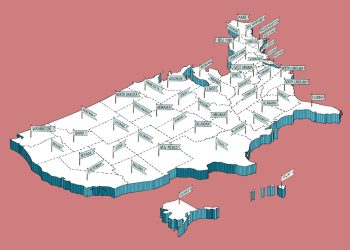ERA® Real Estate recently released a first-of-its-kind report “The COVID-19 Pandemic’s Impact on Real Estate Around the World: An In-Depth Analysis.”
The impact of the COVID-19 pandemic on the real estate industry has been well documented in the United States. Demand outpaced supply with record-low mortgage rates drawing so many buyers in while others took advantage of remote work to vacate urban centers for more affordable locations.
To learn how COVID-19’s impact was felt in the housing market in countries around the world, ERA surveyed and conducted in-depth interviews with several ERA international leaders from around the world, including ERA South Africa, ERA Japan and ERA Middle East.
“Few things transcend cultures and countries like the sentiment ‘there’s no place like home.’ As COVID-19 spread worldwide, the entire global community became more intimately acquainted with their homes as we stayed home to slow the spread of the virus by reducing contact with others. This experience motivated many to rethink their housing situation, which in turn had an impact on housing markets around the world,” said Sherry Chris, president and CEO of ERA® Real Estate, in a statement. “Through ERA Real Estate’s expansive global network of real estate professionals, we were able to gather insights to help us better understand how different countries fared over the last year and half. What we learned is that while many industries languished during the pandemic, real estate remained ‘open for business,’ underscoring that housing is an essential service no matter where you live.”
The results of the report found that many nations are experiencing real estate trends similar to the U.S.:
– Low inventory and increasing prices are prevalent around the world
– Flight to the suburbs made sense in many countries
– The second home market was invigorated by the pandemic
– The desire to own a home is stronger than ever
However, some countries reported different trends, such as:
– Mortgage interest rates hovering at or below 1%
– Some nations have limited suburban and rural living options making larger and amenity-filled apartments more desired and valuable
– Safety can have different meanings depending on a country’s political and economic climate
Overall, the pandemic forced people to rethink what home means to them, with 87% of the countries served by respondents seeing an increase in homeowners moving to the suburbs.
“Overall, the housing industry in Europe is sustainable. The COVID-19 pandemic has certainly heightened the housing shortage greatly because of the pause in construction; however, the only thing that would lead to a slowdown would be a rise in interest rates,” said Francois Gagnon, master franchisor, ERA Europe, in a statement. “For agents, their success was dependent on their mindset about change. Agents who stayed connected to their brokers via Zoom had a very successful year.”
“People in Singapore are still confident to come into the housing market. We sold more units in 2000 than in 2019. In the first half of 2021, we have sold more units than this time last year—more than double,” said Jack Chua, master franchisor, ERA Singapore, in a statement. “The market is still hot, and we think the momentum will carry forward. Mortgage rates are still low, and people still consider real estate a good investment.”
For more information, please visit www.era.com/global-hq.











